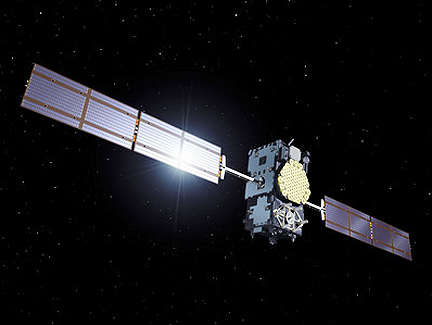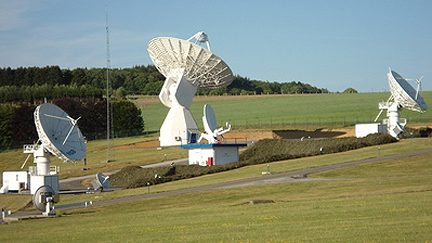European Space Agency... Redu Receives (Satellite)
[SatNews] Europe’s Galileo system has passed its latest milestone....
 Artist's impression of the Galileo IOV satellite. Credits: ESA
Artist's impression of the Galileo IOV satellite. Credits: ESA
....transmitting its very first test navigation signal back to Earth. The first two
Galileo satellites, launched on 21 October, are in the midst of their In-Orbit Test campaign. A detailed check-up is being carried out by
ESA's
Redu ground station in Belgium to ensure their payloads are performing as specified, with no degradation from the launch. The different Galileo signals are being activated and tested one by one. Soon after the payload power amplifiers were switched on and ‘outgassed’– warmed up to release vapours that might otherwise interfere with operations – the first test signal was transmitted in the early morning of Saturday, December 10th, by the first Galileo satellite. This signal was then captured at Redu.
 Galileo's 20-m IOT L-band antenna is the largest dish at ESA's Redu ground station. Credits: ESA
Galileo's 20-m IOT L-band antenna is the largest dish at ESA's Redu ground station. Credits: ESA
The test signal was transmitted in the ‘E1’ band, which will be used for Galileo’s
Open Service once the system starts initial operations in 2014. The Open Service will be freely available to users all over the world. This signal is particularly important because it shares the ‘
L1’ band of the U.S. GPS navigation satellites. Redu was selected for the campaign because of its long heritage performing similar assignments for European telecommunications satellites. For Galileo, the Redu centre is equipped with a 20m-diameter L-band antenna, needed to assess the quality of the navigation signals at the high accuracy and cleanliness needed with the satellites being 23 222km up in orbit – and with a C-band transmit antenna to test the onboard mission receiver and uplink navigation messages to the satellite. A UHF antenna is also available for transmitting search and rescue test signals to the satellites.
Redu is the geographical focus of a Europe-wide effort. Command and control of the satellites is being undertaken from a dedicated Galileo Control Centre in Oberpfaffenhofen near Munich in Germany, with control of the payloads and their navigation signals being performed from the second centre in Fucino, central Italy. Until the end of this year, the test campaign is concentrating on the first satellite. The focus will move to the second Galileo satellite in January, with the aim of completing the In-Orbit Test in the first quarter of 2012.
Topical Tags :
Regional Tags :



